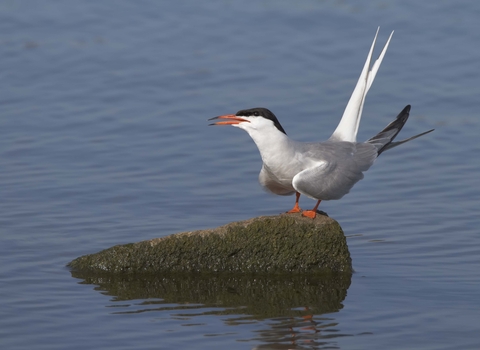
©Richard Steel/2020VISION
Common tern
During the breeding season, the common tern can be seen around our coasts and also inland at gravel pits, reservoirs and lakes. It nests in noisy colonies and can be spotted plunge-diving for fish.
Enw gwyddonol
Sterna hirundoPryd i'w gweld
April to SeptemberTop facts
Stats
Length: 31-35cmWingspan: 77-98cm
Weight: 90-150g
Average lifespan: 12 years
Classified in the UK as Amber under the Birds of Conservation Concern 5: the Red List for Birds (2021).
Habitats
Ynghylch
The common tern is a medium-sized tern and the one you are most likely to see inland, as well as at the coast. Common terns breed on shingle beaches, rocky islands and inland on the gravelly shores of lakes and rivers. They are noisy in their colonies and, like most terns, will attack intruders threatening their nests. They hover over the water before plunge-diving to catch their fish prey.What to look for
Common terns and Arctic terns can be very difficult to tell apart. The common tern is whiter below, has shorter tail streamers, and has a longer bill, which is orangey-red with a black tip. It is silvery-grey above, with a black cap and short, red legs.Where to find
A summer visitor, nesting on gravelly beaches and islands around the coast and on inland flooded gravel pits and reservoirs.Roeddech chi yn gwybod?
The common tern's long tail 'streamers' (feathers extending past the main tail) have earned it the nickname 'sea-swallow'.Gwyliwch
Common Tern (https://vimeo.com/444192856)
Common Tern by Tom Hartwell
